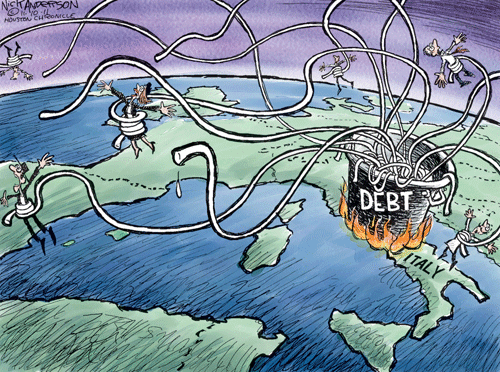Cross posted from The Stars Hollow Gazette
 I’m no expert on the bond market but I do know that when a bond interest rates rise, it is more expensive for the holder of those bonds to borrow money. That’s an over simplification as it pertains to the situation that has been developing with the Eurozone that is possibly on the verge of collapse due to the economic instability of Greece and, now, Italy. Of course, it is affecting market around the world. On Tuesday there was a massive sell off of all Eurozone bonds that is threatening the stability of the Eurozone. David Dayen explains:
I’m no expert on the bond market but I do know that when a bond interest rates rise, it is more expensive for the holder of those bonds to borrow money. That’s an over simplification as it pertains to the situation that has been developing with the Eurozone that is possibly on the verge of collapse due to the economic instability of Greece and, now, Italy. Of course, it is affecting market around the world. On Tuesday there was a massive sell off of all Eurozone bonds that is threatening the stability of the Eurozone. David Dayen explains:
Under current arrangements, the Eurozone doesn’t even have the money to save Italy. If the core countries start to lose their credit ratings and cannot afford to borrow, we’re really just done here. Spanish debt is also above the level where they would need a bailout, another troublesome sign.
About the only country on somewhat solid footing is Germany, and this has sowed resentment, particularly because of their domineering response to the crisis. Austerity for thee and not for me is bound to create a backlash.
This is all happening because the European Central Bank refuses to honor the “central bank” part of its name. This is dragging down all of Europe. Edward Harrison works through the issues in Italy, which is ground zero here.
Italy needs to run a primary budget surplus (excluding interest payments) of about 5 percent of GDP, merely to keep its debt ratio constant at present yields. It won’t ever be able to do so.
Therefore, yields for Italian bonds must come down or Italy is insolvent as it must roll over 300 billion euros of debt in the next year alone.
Austerity is not going to bring Italian yields back down. First, Italian solvency is now in question and weak hands will sell. Moreover, investors in all sovereign debt now fear that they are unhedged due to the Greek non-default plan worked out in Brussels last month. As Marshall Auerback told me, any money manager with fiduciary responsibility cannot buy Italian debt or any other euro member sovereign debt after this plan.
Conclusion: Italy will face a liquidity-induced insolvency without central bank intervention. Investors will sell Italian bonds and yields will rise as the liquidity crisis becomes a self-fulfilling spiral: higher yields begetting worsening macro fundamentals leading to higher default risk and therefore even higher yields.
Nobel Prize winning economist, Paul Krugman, mostly agrees with Harrison’s assessment of how the euro will end if the ECB doesn’t step in with a massive bail out and adds his thoughts:
I might place greater emphasis on the immediate channel through which falling sovereign bond prices force bank deleveraging, but we’re picking nits here.
And this is totally right:
If the ECB writes the check, the economic and market outcomes are vastly different than if they do not. Your personal outlook as an investor, business person or worker will change dramatically for decades to come based upon this one policy choice and how well-prepared for it you are.
Crunch time. If prejudice and false notions of prudence prevail, the world is about to take a major change for the worse.
There are a number of factors here. Without the backing of Germany, the only Eurozone country with money, the ECB doesn’t have enough money to cover Italy’s debt and Germany’s participation hinges on their demand for austerity measures. The the elephant of a question then becomes what happens if the ECB doesn’t write the check? What if the ECB let’s Italy default, what then?
Harrison’s article at naked capitalism on the Italian default scenarios is long but well worth reading for the suggestions for investors on how they can protect themselves in either event.

1 comment
Author